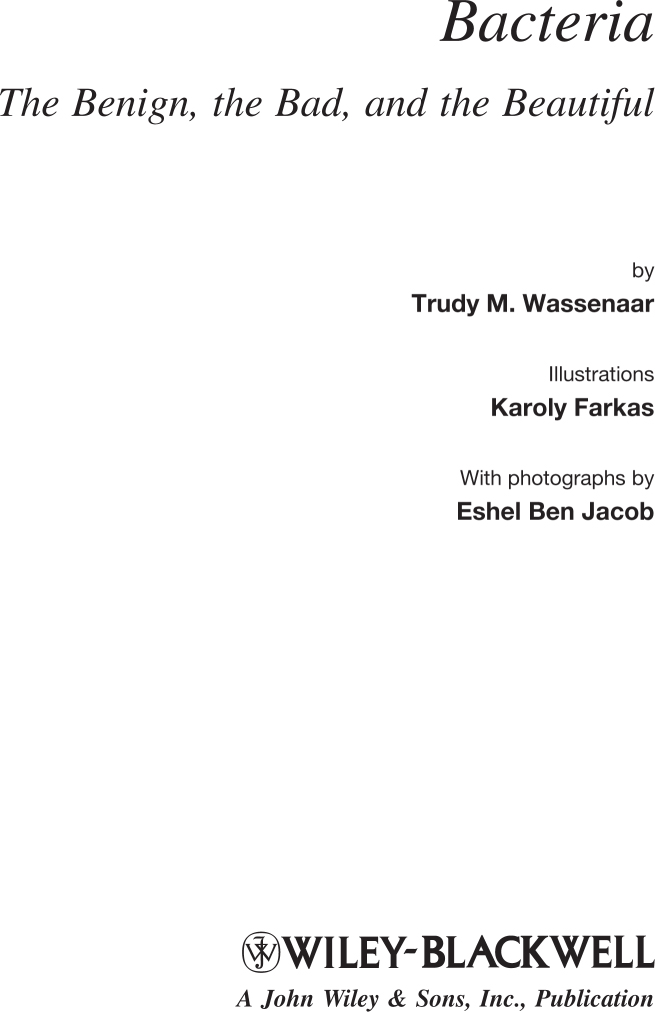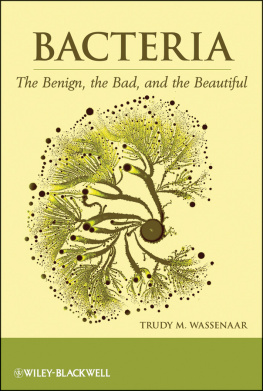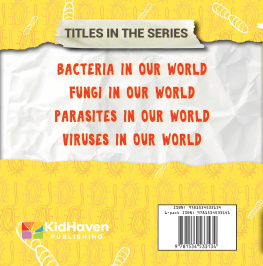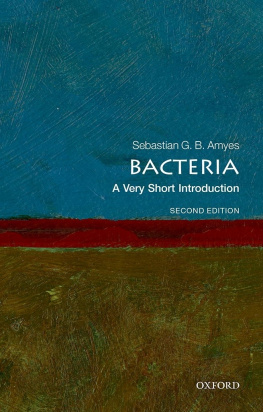Wassenaar - Bacteria
Here you can read online Wassenaar - Bacteria full text of the book (entire story) in english for free. Download pdf and epub, get meaning, cover and reviews about this ebook. year: 2011, publisher: John Wiley & Sons, genre: Religion. Description of the work, (preface) as well as reviews are available. Best literature library LitArk.com created for fans of good reading and offers a wide selection of genres:
Romance novel
Science fiction
Adventure
Detective
Science
History
Home and family
Prose
Art
Politics
Computer
Non-fiction
Religion
Business
Children
Humor
Choose a favorite category and find really read worthwhile books. Enjoy immersion in the world of imagination, feel the emotions of the characters or learn something new for yourself, make an fascinating discovery.
Bacteria: summary, description and annotation
We offer to read an annotation, description, summary or preface (depends on what the author of the book "Bacteria" wrote himself). If you haven't found the necessary information about the book — write in the comments, we will try to find it.
Bacteria — read online for free the complete book (whole text) full work
Below is the text of the book, divided by pages. System saving the place of the last page read, allows you to conveniently read the book "Bacteria" online for free, without having to search again every time where you left off. Put a bookmark, and you can go to the page where you finished reading at any time.
Font size:
Interval:
Bookmark:


Copyright 2010 by John Wiley & Sons, Inc. All rights reserved.
Published by John Wiley & Sons, Inc., Hoboken, New Jersey.
Published simultaneously in Canada.
No part of this publication may be reproduced, stored in a retrieval system, or transmitted in any form or by any means, electronic, mechanical, photocopying, recording, scanning, or otherwise, except as permitted under Section 107 or 108 of the 1976 United States Copyright Act, without either the prior written permission of the Publisher, or authorization through payment of the appropriate per-copy fee to the Copyright Clearance Center, Inc., 222 Rosewood Drive, Danvers, MA 01923, (978) 750-8400, fax (978) 750-4744. Requests to the Publisher for permission should be addressed to the Permissions Department, John Wiley & Sons, Inc., 111 River Street, Hoboken, NJ 07030, (201) 748-6011, fax (201) 748-6008, or online at http://www.wiley.com/go/permission.
Limit of Liability/Disclaimer of Warranty: While the publisher and author have used their best efforts in preparing this book, they make no representations or warranties with respect to the accuracy or completeness of the contents of this book and specifically disclaim any implied warranties of merchantability or fitness for a particular purpose. No warranty may be created or extended by sales representatives or written sales materials. The advice and strategies contained herein may not be suitable for your situation. You should consult with a professional where appropriate. Neither the publisher nor author shall be liable for any loss of profit or any other commercial damages, including but not limited to special, incidental, consequential, or other damages.
For general information on our other products and services or for technical support, please contact our Customer Care Department within the United States at (800) 762-2974, outside the United States at (317) 572-3993 or fax (317) 572-4002.
Wiley also publishes its books in a variety of electronic formats. Some content that appears in print may not be available in electronic formats. For more information about Wiley products, visit our web site at www.wiley.com.
Library of Congress Cataloging-in-Publication Data:
Wassenaar, Trudy M.
Bacteria : the benign, the bad, and the beautiful / Trudy M. Wassenaar.
p. cm.
Includes index.
ISBN 978-1-118-10766-9 (hardback)
1. Bacteria. 2. Bacteria-Ecology. 3. Microbiology. I. Title.
616.9'201dc23
2011021003
Preface
This book is meant to be an antidote.
An antidote to neutralize some of the bad press that bacteria frequently receive, which could easily leave the impression that bacteria's main aim is to attack us, make us sick, or even kill us. Such press imprints us with the idea that all bacteria are mostly concerned with one goal: to damage humans where and when they can. This does not apply to the vast majority. Despite the few nasty ones out there, most bacteria are completely harmless, and this book tries to restore their reputation.
This book is an antidote to balance all existing books on biological subjects that completely ignore bacteria, pretending they are not important. As if a plant or animal could survive without bacteria (they cannot). As if mammals do not carry more bacteria than body cells. As if these bacteria living inside and on us do not carry more genes than our own genome does. Let's face it: we are a living support for bacteria, and these little wonders of evolution made us what we are.
The antidote is meant for future students who will likely be taught only a fraction of the knowledge that is available about bacteria. Medical microbiology mainly teaches about bacteria that cause disease, ignoring the fact that these account for a small minority that inhabit the bacterial world. Food microbiologists may concentrate on food poisoning, bacteria needed for food processing, or even those causing spoilage, but they often remain oblivious to the bacteria that helped these plant and animal foods to grow in the first place. Marine microbiologists learn little about bacteria living in soil, and so on. Why not start with a little knowledge about everything, before specializing. It will stimulate an open mind to science as a whole.
This book is also meant to be an antidote for all those who think bacteria are boring. Obviously they are not; otherwise, these pages could not have been filled. However, the fact that you intend to read this book means that you display an interest in bacteria, or at least you are willing to make their acquaintance. You may thus not be the audience for which the antidote would be most effective, but at least it is hoped your interest is rewarded, and that you enjoy reading about this invisible subject, bacteria, which can be bad, benign or beautiful, but certainly not boring.
Note to the Reader
No prior knowledge about bacteria by the reader is assumed, although a general acceptance that bacteria exist, and some rudimentary knowledge of biology and chemistry is expected (and a faint idea about medicine, geology, geography and history). All scientific concepts are explained the first time they are introduced but used without much explanation in following chapters. Although all chapters can be read independently, it is, therefore, better to start with the first chapter and then just keep reading. The use of jargon and technical language is avoided, with the exception of scientific bacterial names. A glossary of scientific terms at the end of the book may prove helpful.
All bacterial species that feature in this book are listed in the alphabetical index at the end. A subject index is also provided.
Students who are interested in in-depth information might find the bibliography useful, where scientific literature is listed for each chapter.
The interested reader might be tempted to investigate particular subjects further, for which the Internet is a great resource. Such initiatives can only be encouraged. However, a considerable proportion of the information on microbiology provided by this medium is imprecise or conflictive, if not completely wrong. All subjects treated in this book were carefully checked with recent scientific literature, and a current consensus of opinion is presented where possible. Scientific interpretations sometimes differ between sources, and in these cases the choice of presented options is subjective.
The characters of Mrs. White, Joe, and Liz are imaginary. Scientific and noble titles of existing persons have been omitted throughout.
Chapter 1
The Blue Planet
Imagine an intelligent species of extraterrestrial life that decides to explore our planet by sending sensors that report back visual information. Since these living beings are intelligent, they know that they should not base their judgments on single observations, so they send five sensors to different locations. These sensors happen to land in a city, in the ocean, in a forest, in a dry spot of a desert, and on Antarctica. They are equipped with very sensitive lenses that can see details at a micrometer scale, a thousandth of a millimeter. What would they report back to their home planet?
The extraterrestrial scientists would not bother about the single observations of humans and buildings reported by the first sensor. Nor would they pay attention to the fish and other marine animals, to the trees and plants, rocks and sand, or snow and ice, reported by the other respective sensors. These all appear to be location-dependent phenomena. The common and consistently reported observations would indicate the presence of bacteria, which are detected by each sensor, in large numbers and with great variety. These tiny cells appear omnipresent. The scientists would report, in their extraterrestrial newspaper, that the blue planet is the home of bacteria.
Font size:
Interval:
Bookmark:
Similar books «Bacteria»
Look at similar books to Bacteria. We have selected literature similar in name and meaning in the hope of providing readers with more options to find new, interesting, not yet read works.
Discussion, reviews of the book Bacteria and just readers' own opinions. Leave your comments, write what you think about the work, its meaning or the main characters. Specify what exactly you liked and what you didn't like, and why you think so.











